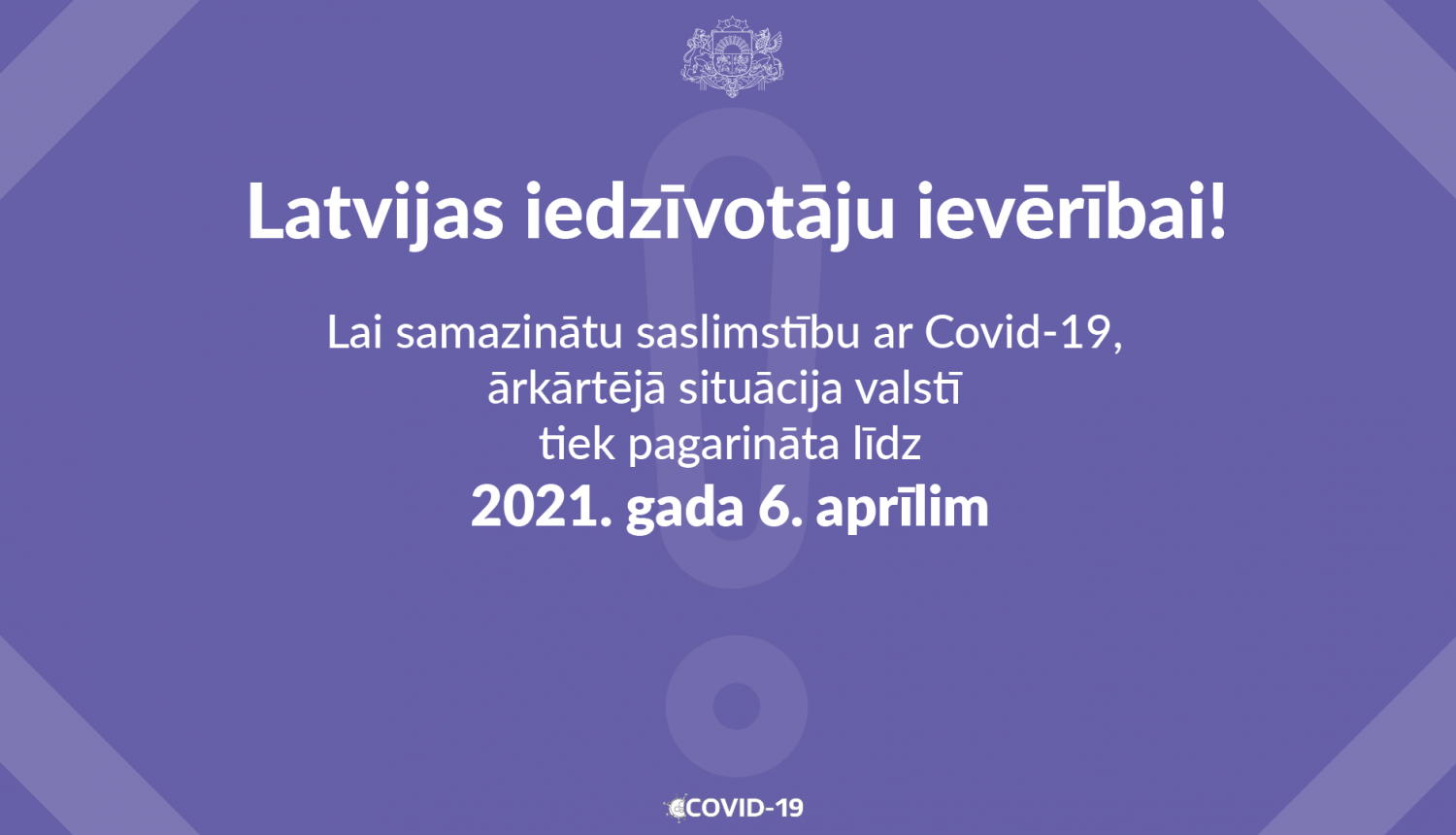On Friday, 5 February, the Cabinet of Ministers decided to extend the emergency situation until 6 April. From the next Monday, 8 February, higher safety standards for the on-site trade will take effect, marking the first steps of moving away from the list of inventories. Some pupils and students will have access to on site consultations. Meanwhile, it will be possible to enter Latvia only in urgent cases.
In the field of education
Considering that the number of new cases of Covid-19 infection has increased in recent days, the Cabinet of Ministers has decided that it is not possible to allow the resuming of full-time studies of 1st and 2nd grade students for the time being. Discussions in the government on an epidemiologically safe full-time learning process will continue.
On site consultations will be available to all students at risk of dropping out, as well as to 12th grade students and vocational school students who have to pass state examinations. Individual on-site acquisition of practical skills will also be possible for university students who are studying various medical and veterinary medicine programs in the last year of studies.
Strict requirements for safer trade
The Cabinet of Ministers approved a set of requirements for safe trade developed in cooperation with representatives of entrepreneurs and employers. It imposes a number of obligations on points of sale to reduce the risk of crowding. Stores and market pavilions must provide an area of 25 square meters per visitor and information on the maximum number of visitors must be displayed in a visible place at the entrance.
Visitors are allowed to go to the store one by one, except for people who need the help of an assistant and children under the age of 12 accompanied by one adult. Visitors to the store are invited to follow the requirements set at the points of sale - do not crowd at the entrance, use baskets or trolleys, observe the marks.
In addition to the obligations of merchants, the right of the State Police and the municipal police to make a decision on the immediate closure of the point of sale for visitors for a period of up to seven days was confirmed. Such a decision can be made both for an individual store and for the shopping centre as a whole, depending on the infringement and liability.
Enhanced epidemiological safety requirements at points of sale, shopping centres and market pavilions should be introduced from 8 February.
Changes in on site retail
From 8 February, in line with the principles of "safe trade", the first steps will be taken to move away from restrictive lists of on-site purchases. The entire assortment of goods may be sold on site in stores where at least 70% of the product range is groceries. Similarly, in stores where at least 70% of the product range is hygiene products, also all other products may be sold on site.
Bookstores will also be allowed to sell the full range of goods, i.e. goods allowed so far, stationery, and books.
Pharmacies, opticians, and fuel stations are continuing their work within the framework of the current emergency situation regulation. Other points of sale may still sell groceries, hygiene products, essential household goods, mobile phone prepaid cards, tobacco products, animal feed and goods, public transport tickets, mouth and nose coverings and individual protective equipment, as well as artisanal agricultural products and flowers.
From 8 February, it will be possible to purchase on site electrical accessories (wires, extension cords, chargers), pesticides (disinfection and deratization), as well as significant plants, seedlings, bulbs, tubers and seeds, substrates, and some materials for soil improvement as spring approaches.
International travel only in emergencies
The Government also changed the entry procedure to reduce the entry of new, especially dangerous Covid-19 versions into Latvia. From 11 February to 25 February, it will be allowed to enter Latvia only for urgent and important reasons. Entry is allowed for work, learning and study purposes, as well as for humanitarian reasons - to reunite a family, to receive medical services, to accompany a minor, to return to one’s place of residence, or to go to a funeral.
The reason for entry must be indicated by filling in the questionnaire on the website covidpass.lv before arrival in Latvia, while the documents confirming the reason for arrival must be ready to be presented upon request to the State Police or the State Border Guard. Documents do not need to be prepared for presentation if they are already available in one of the national information systems, such as information on residence and relationship.
It is important that passenger carriers may not pick up passengers who have not indicated the reason of their arrival in the covidpass.lv system. Immigrants are also still obliged to take the Covid-19 test before arriving in Latvia and to observe self-isolation immediately upon arrival.
International passenger transport between Latvia and the United Kingdom, Ireland and Portugal has also been temporarily suspended. This applies to air traffic, bus services and ship conveyance.
Discussions on proportionate improvements in immigrant control will continue at the next meeting of the Cabinet of Ministers.
Discussions will also continue regarding the "weekend curfew" provision. Until 7 February, movement restrictions are still in force from 22.00 to 5.00 on the nights from Friday to Saturday and from Saturday to Sunday.



